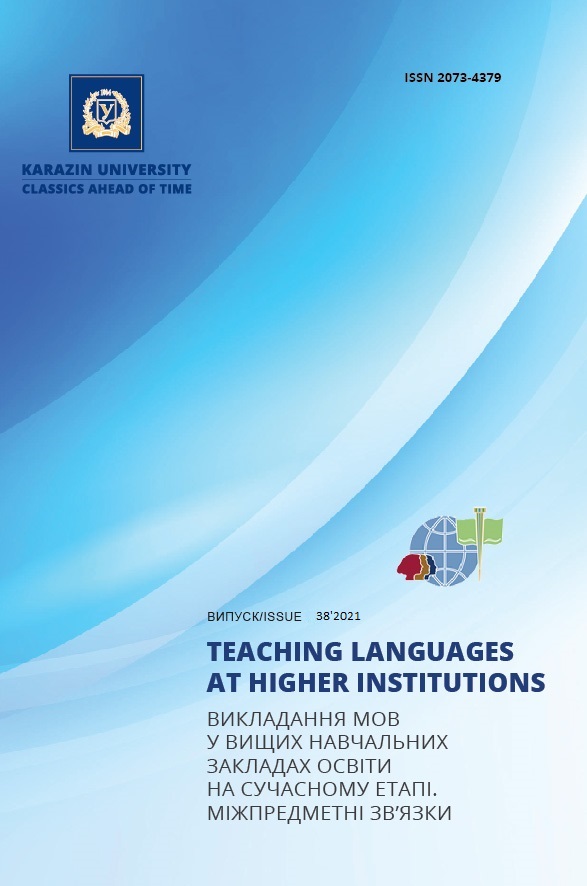Інформаційно-комп’ютерні технології у дистанційному навчанні іноземних мов з використанням соціальних мереж (у туніській аудиторії)
Анотація
Тема статті пов’язана з висвітленням питання застосування інформаційно-комп’ютерних технологій у викладанні іноземних мов, зокрема їхньої адаптації до умов дистанційного навчання. У статті розглядаються різні підходи до використання сучасних технологій в освітньому просторі та, зокрема, прийоми роботи з комп’ютерними засобами у туніському гуманітарному закладі вищої освіти. Характеризуються технології Веб 2.0 як одна з можливостей для збільшення обсягу мовленнєвого спілкування іноземною мовою у дистанційному навчанні та різні типи інтернет-ресурсів, найбільш популярних у Тунісі серед студентів, якi вивчають російську мову. У зв’язку з цим визначаються й узагальнюються особливості впровадження соціальних мереж як додаткової платформи для організації дистанційного навчання у процес формування комунікативної компетенції учнів. Метою опису зовнішніх факторів, що впливають на вдосконалення методичних підходів до розв’язання навчальних завдань, стало виявлення основних напрямів залучення сервісів соціальних мереж і вбудовування їх у структуру онлайн-уроків, а саме: відбір країнознавчого матеріалу та розробка методичних рекомендацій щодо його наближення до програмних тем, обмін інформацією, тестування. Аналітичний метод дослідження проблем, з якими стикаються студенти і викладачі в організації навчального процесу з опорою на цифрові помічники, дозволив класифікувати труднощі в успішному інтегруванні соціальних мереж у навчання. У результаті були визначені правила роботи з соціальними мережами для студентів і викладачів, а також був розкритий потенціал інтернет-сервісів, які завдяки розвитку баз даних та інфраструктури Інтернету полегшили завдання багатьох його користувачів, у тому числі викладачів, бо відпала необхідність мати спеціальні знання та вміння для створення дистанційних курсів.
Завантаження
Посилання
Azimov, E.G. (2008). Metodika prepodavaniya russkogo yazyka kak inostrannogo (lekcii, metodicheskie razrabotki k urokam) [Methods of teaching Russian as a foreign language (lectures, teacher’s guides]. Moscow: YKAR [in Russian].
Azimov, E.G. (2012). Informacionno-kommunikacionnye tekhnologii v prepodavanii russkogo yazyka kak inostrannogo [Information and communication technologies in teaching Russian as a foreign language]. Moscow: Rus. Yaz. [in Russian].
Ben Romdhane, S. (2013). Perspektivy ispolzovaniya socialnyh setej v obuchenii RKI [Prospects for the use of social networks in teaching RFL]. Russkij yazyk za rubezhom [Russian abroad], 3, pp. 101–105 [in Russian].
Ben Romdhane, S. (2014). Osnovnye napravleniya ispolzovaniya socialnyh setej v obuchenii russkomu yazyku kak inostrannomu [The main areas of using social networks in teaching Russian as a foreign language]. Kazanskaya nauka [Kazan science], 2, pp. 189–193 [in Russian].
Ben Romdhane, S. (2014). Metodika ispolzovaniya socialnyh setej v obuchenii russkomu yazyku kak inostrannomu tunisskih studentov-filologov (uroven B1) [Methods of using social networks in teaching Russian as a foreign language to Tunisian students of philology (level B1)]. Candidate’s thesis. Moscow [in Russian].
Bogomolov, A.N. and Uskova, O.A. (2003). Interaktivnoe distancionnoe obuchenie i formy ego realizacii v multimedijnom kurse distancionnogo obucheniya “Novosti iz Rossii” [Interactive distance learning and forms of its implementation in the multimedia distance learning course “News from Russia”]. Russkoe slovo v mirovoj kulture. Materialy X Kongressa Mezhdunarodnoj associacii prepodavatelej russkogo yazyka i literatury [Russian word in world culture. Materials of the X Congress of the International Association of Teachers of Russian Language and Literature]. St. Petersburg: Politekhnika, pp. 25–32 [in Russian].
Demina, G.Yu. (2011). Socialnaya set kak pedagogicheskoe prostranstvo [Social network as a pedagogical space]. Internet-zhurnal “Ejdos” [Internet magazine “Eidos”]. URL: http://www.eidos.ru/journal/2011/0325-04.htm [Accessed 15 Feb. 2021] [in Russian].
Sysoev, P.V. (2013). Informacionnye i kommunikativnye tekhnologii v lingvisticheskom obrazovanii [Information and communication technologies in linguistic education]. Moscow [in Russian].
Tryapelnikov, A.V. (2008). Virtualnye formy organizacii samostoyatelnoj raboty [Virtual forms of organization of independent work]. Russkij yazyk za rubezhom [Russian abroad], 3, pp. 33–37 [in Russian].
Shchukin, A.N. (2006). Obuchenie inostrannym yazykam. Teoriya i praktika: Uchebnoe posobie dlya prepodavatelej i studentov [Teaching foreign languages. Theory and Practice: A Textbook for Teachers and Students]. Moscow: Filomatis [in Russian].
Davidson, Lauren. (2015). Is your daily social media usage higher than average? Available at: http://www.telegraph.co.uk/finance/ newsbysector/mediatechnologyandtelecoms/11610959/Is-your-daily-social-media-usage-higher-than-average.html [Accessed 15 Feb. 2021] [in English].

